Facebook to limit political ads ahead of November election
CEO Mark Zuckerberg says everyone has a responsibility to protect democracy.

Facebook is also limiting forwarding on Messenger to help prevent misinformation from going viral.
Facebook CEO Mark Zuckerberg on Thursday outlined several steps the social media site is taking to encourage voting and to fight misinformation ahead of the US elections in November. In addition to efforts already in place, Zuckerberg said Facebook will expand its policies addressing voter suppression and block new political and issue ads during the final week of the campaign.
In an interview with CBS This Morning about its election policies, Zuckerberg said Facebook will also add context to posts -- including those from President Donald Trump -- that seek to broadly delegitimize mail-in voting or the outcome of the election. (Editors' note: CBS and CNET are both part of ViacomCBS.)
"Anyone who is saying that the election is going to be fraudulent, I think that's problematic and I think additional context needs to be added to that," Zuckerberg told CBS This Morning co-anchor Gayle King. "This will definitely apply to the president. Once this policy goes into place, it will apply to everyone equally."
Only on @CBSThisMorning, @Facebook's Mark Zuckerberg reveals new measures the social media giant is taking before the election.
— CBS This Morning (@CBSThisMorning) September 3, 2020
In an exclusive interview, Zuckerberg tells @GayleKing he wants users to have accurate information on the safety & security of mail-in voting. pic.twitter.com/xnNqC5eveh
Facebook will also remove posts with "implicit misrepresentations" about how or when to vote, Zuckerberg said in a post on the social network, as well as posts that claim people will get COVID-19 if they take part in voting.
Misinformation on social networks has been a top concern since Russian trolls used Facebook and other sites to post content aimed at sowing discord among Americans during the 2016 US presidential election. Facebook has also been under fire for not sending posts from politicians to fact-checkers, while also fending off allegations that it censors speech from conservatives.
Facebook will block new political and issue ads in the week before the Nov. 3 election since there may not be enough time to contest claims made in them, Zuckerberg said. Ads related to get-out-the-vote campaigns, and political ads purchased before the final week will continue to run. Facebook earlier this year rolled out a feature to let people turn off all political ads.
Samantha Zager, a spokesperson for Trump's reelection campaign, criticized Facebook's decision.
"In the last seven days of the most important election in our history, President Trump will be banned from defending himself on the largest platform in America," Zager said in an emailed statement. "When millions of voters will be making their decisions, the President will be silenced by the Silicon Valley Mafia, who will at the same time allow corporate media to run their biased ads to swing voters in key states."
Facebook's new policy doesn't ban Trump from defending himself, and it will block new political and issue ads from all campaigns.
The campaign for Democratic nominee Joe Biden didn't immediately respond to a request for comment.
Facebook is also limiting forwarding on Messenger to help prevent misinformation from going viral, a method Zuckerberg said has already been effective on WhatsApp.
Given that many people are expected to vote by mail due to the coronavirus pandemic, Facebook is also preparing to deal with "intense claims and counter-claims as the final results are counted," Zuckerberg said. Among the polices the social media site is putting in place to deal with this: using its Voting Information Center to prepare people for not getting a result on election night; labeling posts from politicians who declare victory before results are in; expanding its definition of high-risk people to include election officials to prevent attempts to pressure or harm them; and ramping up enforcement against militias and conspiracy networks like QAnon.
On Tuesday, Zuckerberg and Priscilla Chan announced they're committing $300 million to support voting and election infrastructure in the US ahead of the November election.
"I believe our democracy is strong enough to withstand this challenge and deliver a free and fair election -- even if it takes time for every vote to be counted," Zuckerberg wrote in his post on Thursday. "But it's going to take a concerted effort by all of us -- political parties and candidates, election authorities, the media and social networks, and ultimately voters as well -- to live up to our responsibilities."

